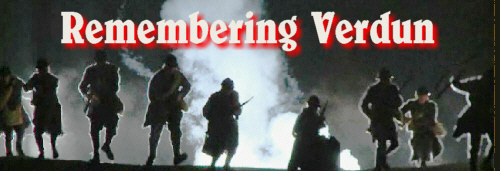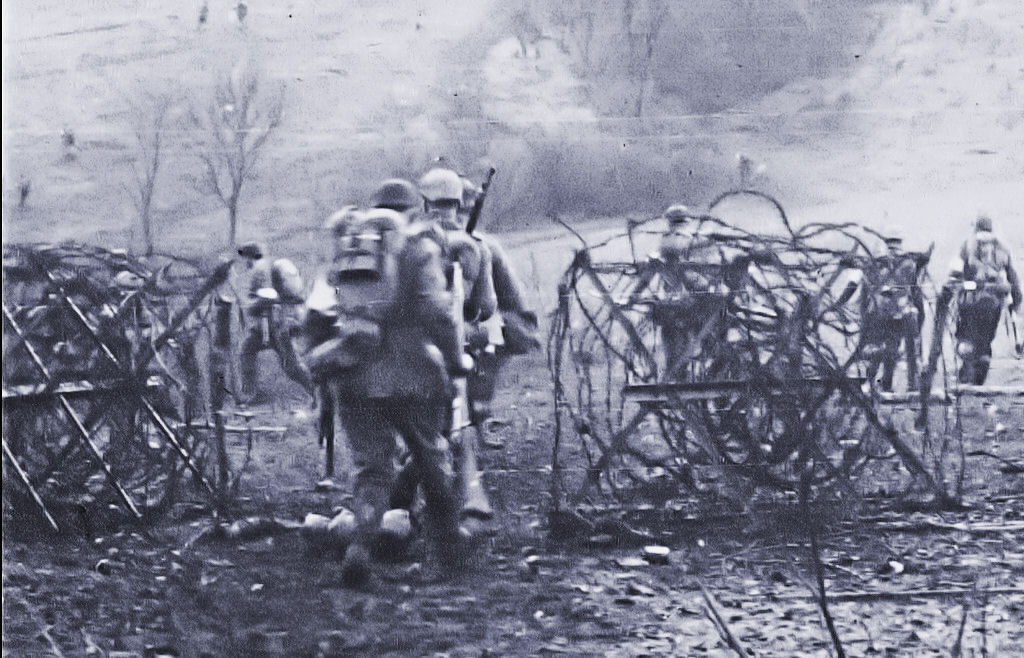
Today we begin an eight-day series on the Battle of Verdun, which began 98 years ago and lasted 300 days, making it the longest battle of the Great War.
Verdun: The Longest Battle of the Great War
By Paul Jankowski
Published by Oxford University Press, 2013
The ambition of this book is to tell the story of Verdun by mixing the old history with the new, the cold calculus of terrain gained and shells expended, and lives lost with the depths of human experience on both sides. It aims to give the total history of the battle (p. 8).
By successfully achieving the goals he outlines in the above quote, Paul Jankowski has given us one of the best studies of the Battle of Verdun available today. The book is also timely in that we are now entering the centennial period of WWI and that 21 February 2014 is the 98th anniversary of the start of Verdun's bloodletting.
Other books have been written on Verdun, of course, including Alistair Horne's 1962 classic The Price of Glory and John Mosier's more recent Verdun: The Lost History (to be reviewed here next week). Doubtless other scholarly and historical studies exist or soon will. Literature has also dealt with the battle, most notably with the 1938 French epic novel Verdun by Jules Romains and the moving personal account in Martha Hanna's chapter "Here It Is Extermination on the Ground" in her Your Death Would Be Mine (2006). The genius and appeal of Jankowski's Verdun: The Longest Battle of the Great War is that the author so effectively combines both modes: the historical and the personal.
Apparently the German intention was not so much to conquer Verdun as to practice Ausblutung, "the mortal bleeding of the enemy in a battle of attrition." The French, meanwhile, fought for their territory and their honor over the symbol of Verdun, ensuring that Ils n'ont pas passé. These aims inevitably led to the costly ongoing stalemate that Jankowski fully analyzes in his chapters dealing with the "offensive trap," "the prestige trap," and the "attritional trap" that the opposing armies fell into. In Chapter 7, "The Nightmare," we are brought close to the experience of the soldiers, both French and German, through their letters and memoirs. Shells, shrapnel, mud, rain, rats, lice, hunger, and thirst all plagued the soldiers. Fear and despair found their place but also comradeship, loyalty, and even religious faith. Resentment of those not at Verdun was widespread, as was the feeling of abandonment by politicians and senior officers.
By successfully achieving the goals he outlines in the above quote, Paul Jankowski has given us one of the best studies of the Battle of Verdun available today. The book is also timely in that we are now entering the centennial period of WWI and that 21 February 2014 is the 98th anniversary of the start of Verdun's bloodletting.
Other books have been written on Verdun, of course, including Alistair Horne's 1962 classic The Price of Glory and John Mosier's more recent Verdun: The Lost History (to be reviewed here next week). Doubtless other scholarly and historical studies exist or soon will. Literature has also dealt with the battle, most notably with the 1938 French epic novel Verdun by Jules Romains and the moving personal account in Martha Hanna's chapter "Here It Is Extermination on the Ground" in her Your Death Would Be Mine (2006). The genius and appeal of Jankowski's Verdun: The Longest Battle of the Great War is that the author so effectively combines both modes: the historical and the personal.
Order Now |
Click on Image to Expand
 |
| German Forces Advancing During the Opening of the Battle, February 1916 |
There are many ways of looking at Verdun, and more than one 'truth' to be discovered. The author takes all these perplexities, looks at them from various angles and based on solid research gives us multiple insights into the conflict. Why did the Germans attack Verdun? Was it to "bleed France dry?" Was Verdun that important to the French — or to the Germans? How did the personalities of the politicians and generals shape what happened, and how were these events interpreted? When and how did Verdun reach the level of epic martyrdom and even myth in the minds of those involved? Jankowski provides ample material to enable us to see answers to these and other complex questions.
When you read Verdun: The Longest Battle of the Great War, you feel you have been exposed to just about every event, maneuver, viewpoint, and emotion that can possibly be associated with the battle. The story is presented in coherent and clear prose solidly documented along the way with substantial source notes. Two helpful maps and several photographs enhance the book, and an impressive bibliography particularly rich in French and German sources rounds out the volume. Jankowski has given us the best of all worlds — an original, informative and scholarly work that is eminently readable.
David F. Beer
When you read Verdun: The Longest Battle of the Great War, you feel you have been exposed to just about every event, maneuver, viewpoint, and emotion that can possibly be associated with the battle. The story is presented in coherent and clear prose solidly documented along the way with substantial source notes. Two helpful maps and several photographs enhance the book, and an impressive bibliography particularly rich in French and German sources rounds out the volume. Jankowski has given us the best of all worlds — an original, informative and scholarly work that is eminently readable.
David F. Beer

How does it compare with Horne's great book?
ReplyDeleteMosier is the man on this subject
DeleteGreat review, David. Thank you.
ReplyDeleteGood Work Dr. Beer
ReplyDelete